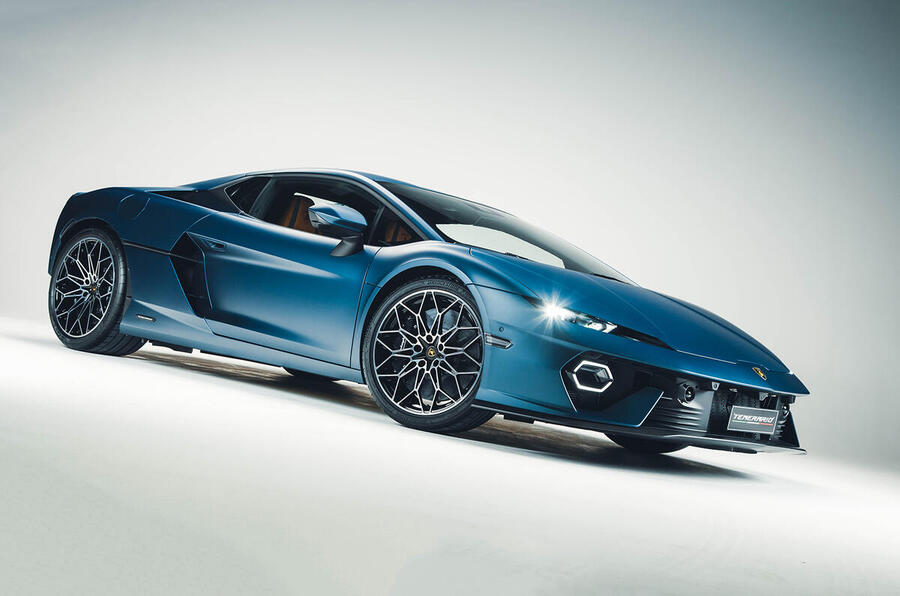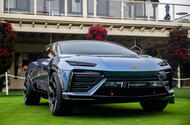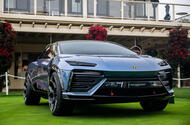Four-seat Lanzador concept will evolve into a production car by 2030
Supercar company won’t delay its debut EV, even amid “flattening” demand, because it’s an all-new model
Lamborghini has no plans to follow Aston Martin and Bentley in delaying its first electric car – but will keep its three new hybrid models on sale for as long as possible.
In an exclusive interview with Autocar at the UK debut of the Lamborghini Temerario supercar, boss Stephan Winkelmann said he was confident that the firm’s previously outlined electrification strategy was “the right one”, because when it comes to launching EVs, “it’s not about innovation, it’s about coming at the right time”.
“When we decided to do the first step of our strategy, to have all the line-up new and hybridised, this was a big effort for the company,” he said. “For the last four years, we have worked very hard on this, and now we see that this was – you never know, but – the right decision. Therefore we think that to be very focused on a step-by-step approach on [electrification] was the right decision.”
Winkelmann’s comments come after other low-volume car makers – including Aston Martin, Bentley and Ineos – pushed back their debut EVs in light of low demand for electric cars.
Lotus, meanwhile, has backtracked on plans to go all-electric and will launch a new range of range-extender hybrids, while Porsche is looking to extend the lifecycle of its current combustion cars in response to low EV uptake in the premium segment.
Winkelmann said that because Lamborghini’s first EV – developed from the segment-bending Lanzador concept of last year – is an all-new model, rather than a replacement for any current car, there is less risk of it impacting the company’s sales volumes – and it could even increase them.
“We have enough time to decide if we need to accelerate or delay the introduction of the electric cars,” he said. “So far, we are not thinking about delaying anything: we said we want to have our first electric car by the end of this decade, and this is something which we will continue to foster, because we said it has to be an additional car – a fourth model.
“It’s an additional model – a new body style, a new type of car in general – so it’s also going to attract new customers to Lamborghini.”
The company is therefore sticking to its plan to launch the production version of the Lanzador by 2030.
Nonetheless, Winkelmann acknowledged that the curve of EV uptake is not “as steep as forecasted” and said this is “even more” true for the super-sports car segment in which Lamborghini operates, so the company’s strategy to “stay hybrid as long as possible is really the right one”.
Following the launch of the Hurácan-replacing Temerario with a new electrified V8 engine, Lamborghini’s three existing model lines are now fully hybridised – and Winkelmann said the company won’t reverse its decision to go all-electrified, even if synthetic fuel proves a viable means of cleanly powering combustion engines in the future.

“I don’t think that battery technology is going to step out of our cars, because at the end of the day, it is something which helps the performance, not inhibits performance,” he said. “And battery technology will evolve, and if we stay hybrid, this is going to help the performance of the cars even more.”
The performance benefits of electrification are clearly helping Lamborghini’s customers to make the jump to hybrid power. The Revuelto, with its battery-assisted V12 engine, is sold out “well into 2026”, and the new Urus SE plug-in hybrid SUV is spoken for through to the end of 2025.
With the Hurácan still in production, Winkelmann would not be drawn on a number of orders for the Temerario but said “we have a lot of interest and already a lot of orders”.
Notably, while the Temerario is down two cylinders on its predecessor, it has a larger engine than its V6-engined rivals, the Ferrari 296, McLaren Artura and Maserati MC20 – and Winkelmann suggested that size advantage, plus the attractive aural bonus of a 10,000rpm redline, will be a significant selling point for Lamborghini’s new entry-level model.
“When you buy a Lamborghini, it’s about the fulfilment, usually, of a dream or a childhood dream, and therefore it’s a very emotional decision. And what we have to always be capable of doing is to have a balance between achieving the desire of our clients and, on the other hand, having a lasting business case for the company.
“We cannot do the things for just one year; it has to last over a decade, mainly. And therefore it’s very important that our engineers are clever enough to put together the thresholds of what the outer world is giving you with the desire of our clients.”


